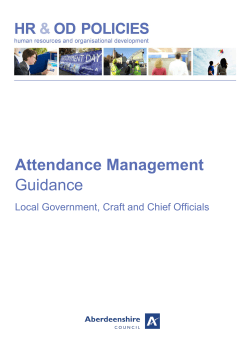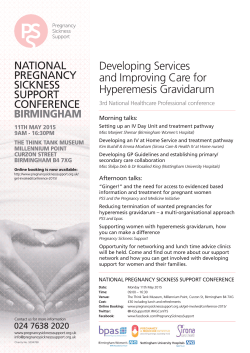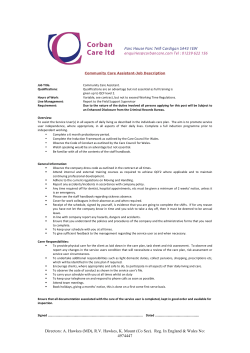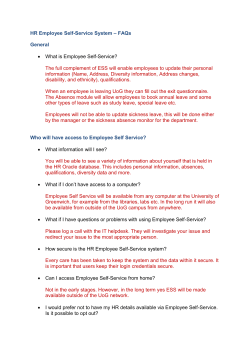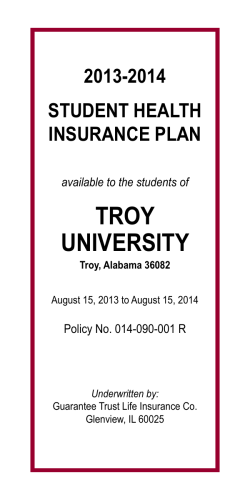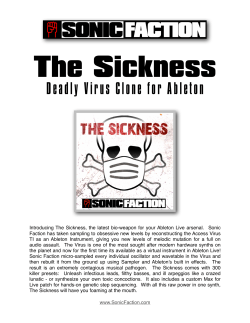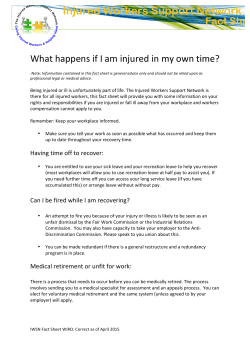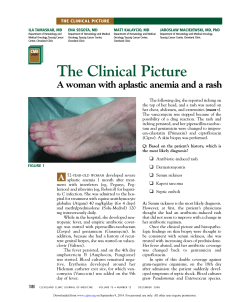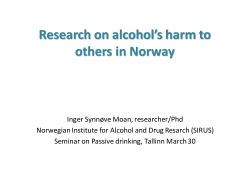
(Managing Attendance) Policy PD 6 - Appendix A
APPENDIX A The Management of Sickness Absence 1. Managing Sickness Absence 1.1 In order to ensure absence is monitored appropriately it is necessary to manage the process from day one. 1.2 When managing sickness the basic procedure remains the same no matter how long the period of absence is: a) An individual reports sick b) Contact made and maintained by manager c) The individual returns to work and reports to manager d) A Return to Work Interview is carried out by the manager 1.3 What varies is the length of the process from a) to d), dependent on the nature or cause of the absence, the length of recovery and if medical or specialist support is required. 1.4 Return to work interviews are an effective tool in the management of all sickness, particularly short-term absences. 1.5 Return to work interviews must be carried out after every occasion of absence no matter how short. Further action may be required beyond the return to work interview. 1.6 Managers need to ensure that their staff are aware of the roles and responsibilities in managing attendance outlined in the policy, and the procedures for reporting sickness and managing short and long-term absence outlined in this document. 1.7 Following procedures apply to Police Officers and Police Staff and must be followed on every period of absence. 2. Notification of Absence 2.1 As soon as an individual is unable to attend work due to illness or injury they will personally report immediately or as soon as practicable to their manager or nominated contact point (local arrangements apply) by telephone or in person. Communication via e-mail or text messages is not appropriate or acceptable. 2.2 Wherever possible staff should notify any absences before their typical starting time and no later than 1 hour after their normal starting time. 2.3 Any absence not reported without due reason will be treated as unauthorised absence and may lead to disciplinary action and loss of pay. 1 APPENDIX A 2.4 Information required 2.4.1 When staff report sick, managers will require the following information: 2.5 2.6 Name and contact number Reason for absence (sickness, injury on duty or other absence) Whether staff have seen their GP or whether they intend to Likely duration of absence When staff expect to return to work Their last working day If any immediate assistance is required If any work needs to be progressed in their absence Medical Certificates 2.5.1 If the absence exceeds 7 days then a fit note is required on Day 8. 2.5.2 If staff are absent for a longer period than stated on the first certificate, then further certificates must be obtained and submitted promptly throughout the absence. There must be no gaps between the expiry of one certificate and the start of the next one if the period of absence is continuous. 2.5.3 Failure to submit a fit note at the appropriate intervals will normally result in loss of pay. Contact During Absence 2.6.1 Contact should be maintained throughout the absence. Full details are outlined in the policy under Roles and Responsibilities. Contact made during the absence should be recorded on Crown DMS by the Line Manager. 3. Return to Work 3.1 As soon as staff know the date on which they are fit to start work again and the date on which they will return to work, they should notify their manager immediately. These dates may differ if for example an individual is fit to return on a rest day. 3.2 On their return to work after any period of absence staff should report to their manager. Staff will then complete the form within Crown DMS and attend a return to work interview. 4. Return to Work Interview 4.1 The interview should take place after each and every absence on the individual’s first day back to work and be carried out by the manager. Where it is not possible to carry out the interview on the first day back the reason must be recorded. 4.2 The interview is confidential with the intention of identifying any needs staff may have to enable their return to work to be effective. The return to work 2 APPENDIX A interview also gives the opportunity for the manager to ensure there are no underlying hidden reasons for the absence that have not been addressed such as stress, bullying or harassment. 4.3 For further information on Return to Work Interviews, see Guidance Notes for Managers. 5. Reporting Sick Whilst at Work 5.1 Any member of staff who reports sick for part of a day will not be treated as being off sick for that day for the purposes of the Statutory Sick Pay Regulations but the absence should be recorded on Crown DMS when it occurs by the Line Manager. 6. Definition of sickness 6.1 Sickness extends to any recognised medical condition, including physical injury and psychological conditions reported by the individual or medical practitioner. Sickness absence data will include absence resulting from assaults. 7. Recording sickness absence 7.1 All sickness absence will be recorded on CROWN DMS, which will be used to start and end the sickness period. For ‘short term’ periods of sickness the Return to Work Form within Crown DMS should be utilised for recording contact. For longer term sickness details this will be recorded in t-police Oracle, e.g. half pay arrangements. 7.2 The Crown DMS system will automatically send the following information to the employee record within t-police oracle: start and finish dates, number of working hours absent, total number of days absent, whether it was an injury on duty, the cause of absence and whether it was covered by a medical certificate or was self certified. 7.3 Sickness absence will be recorded in hours. 7.4 Individuals should include all the shift hours for which they were ordinarily rostered to work during that period. This should include weekends or public holidays if these fall within the rostered period. 7.5 There are a number of instances which should not be included within the declared hours lost to sickness, these include rest days, lost rest days, overtime, time of in lieu, free days (applicable to part time workers), annual leave (where this time is not subsequently reclaimed by the individual) and part days. Relevant examples are attached as an annex to this document (Annex A). 7.6 The provision of accurate data will enable analysis of sickness at an individual, team, departmental or force level and assist in effective management of absence through identifying patterns or trends where there may be underlying causes. It will also enable accurate inter-force comparison of sickness absence. 3 APPENDIX A 7.7 Recording long term absence 7.7.1 7.7.2 7.8 Use the individuals duty roster for as long as it is available and thereafter Use the individuals contracted hours As the basis for determining the total hours lost to sickness for each long-term case. The fact the individual may be on half or nil pay does not affect the number of hours recorded. Disability Related Sickness Absence 7.8.1 7.9 During any period of sickness absence reporting there are likely to be individuals who have been absent due to sickness for a sustained period of time. This period may have extended beyond their current duty roster period. In order to record an appropriate time lost to sickness in hours for such a long-term cases the following principles should be followed: Sickness absence for a reason relating to a disability should be classified as sickness for recording and reporting purposes. The Occupational Health Service will identify and inform line managers where individual cases of sickness absence are disability related. These should be recorded as such on t-Police. Disability Related Leave 7.9.1 Disability leave is not the same as sickness absence. Disability leave is an example of a reasonable adjustment as it allows appropriate absences during working hours for rehabilitation, assessment and treatment. It should be recorded separately to sick leave on a Special Leave Form. 7.9.2 Disability leave enables an officer to adjust to changes caused by a new disability or to manage an existing disability. The leave is for a fixed period so can be planned in advance and must be authorised by the line manager and Head of Department. 7.10 Sickness absence by cause 7.10.1 From April 2005, the Home Office requires all forces to report sickness absence by the ‘Dorset 12’ category. Ensuring that sickness absence is entered into the right ‘Dorset 12’ category will allow an accurate comparison of individual categories between BCUs / departments and between forces. The ‘Dorset 12’ categories, a list of the 81 subcategories, and guidance on how to utilise this data with suitable gate keeping arrangements to prevent infringement of individual privacy is attached as an Annex to this document. It is consistent with Data Protection legislation. 7.11 Retention of Documents 7.11.1 A copy of all sickness documentation will be recorded on t-Police against the relevant individuals record. 4 APPENDIX A 8. Monitoring of absence - the use of triggers 8.1 To effectively manage absence, trigger levels will be used to prompt further investigation, at which point an individual’s absence record will be reviewed and an Attendance Review Meeting arranged. 8.2 In all cases trigger points should be used prudently as a management tool, in the context of being an aid to management and not a substitute for it. 8.3 Managers should be consistent in their approach recognising that each case is individual and investigation into full circumstances should be carried out. Further information can be found in the Guidance Notes for Managers. 8.4 The following are triggers to be used for further investigation: For short term absence - more than 2 periods of absence or 64 hours (8 standard 8 hour days) in a rolling 12 month period. For long term absence – 6 weeks. 9. Managing Short Term Absence 9.1 Short-term absence is any period of 28 days or less. 9.2 Frequent short-term absence can be disruptive and have a detrimental effect on colleagues and the force in terms of planning work and delivering an effective service. It is often more difficult to manage than long term sickness. 9.3 Managers should remember that throughout the management process of trying to reduce frequent absence, while the focus is still on supporting the individual, it should be stressed that even where the sickness absence is genuine it is the frequency of the absence that can become unacceptable. 9.4 Short-term absence can be managed at two levels – the individual and the group level. 9.5 Managing Short Term Absence – the Individual 9.5.1 Where monitoring highlights an individual has frequent short-term absences it is important to respond quickly in order to manage and improve the situation. 9.5.2 This shows the importance of the return to work interview where managers will routinely discuss all periods of absence with their staff. 9.5.3 HR will assist in prompting management action by identifying, with the assistance of the trigger mechanisms, where an individual’s level of absence is cause for concern. 9.5.4 Where an individual has been identified as exceeding the determined trigger levels, a more formal approach than that of a return to work interview should be taken. 5 APPENDIX A 9.6 9.5.5 The manager will arrange an Attendance Review Meeting with the individual to discuss their attendance. This is an informal supportive management action stage of the unsatisfactory attendance procedures for both police officers and police staff. The flowchart in Appendix D shows the procedure for managing short term absence. 9.5.6 An Attendance Review Meeting will be carried out by the manager for every individual whose absence has exceeded the determined trigger levels. Full details on how to conduct the interview are contained in the Guidance Notes for Managers. 9.5.7 The Attendance Review Meeting date will be recorded on t-Police. 9.5.8 Where the Attendance Review Meeting has failed to achieve improvement in attendance then it will be necessary to initiate further action. This is covered in the use of the Police Performance Regulations, Appendix G for police officers and Ill health Procedure for Police Staff, Appendix H. A flowchart in appendix F shows the link between the two procedures. Managing Short Term Absence – Group Level 9.6.1 Departmental Heads along with other managers share responsibility of managing attendance for their department. 9.6.2 Where monitoring shows a serious level of absenteeism in particular groups of staff, attention should be given to the external factors that may be causing the absence. 9.6.3 An analysis of the reasons for the absence may be indicative of an environmental problem and in looking at the work environment rather than focusing on the individuals, the following should be examined: the The quality of supervision including the training of supervisors. Working relationships Job design and workloads Physical conditions such as heating, lighting, noise Workplace assessments including Display Screen Equipment Assessments The level of morale and the reasons 9.6.4 The list is not exhaustive and other factors may also be considered. 9.6.5 Advice can be sought from the Force Health and Safety Adviser and HR 9.6.6 For further information on Managing Short Term Absence refer to: Guidance Notes for Managers Managing Short Term Absence Flowchart 6 APPENDIX A 10. Managing Long Term Absence 10.1 Long-term absence is defined as a period of continuous sickness absence of 29 days or more. 10.2 Staff who are absent from the workplace for long periods of time need extra support to ensure that their return to work is as easy as possible. 10.3 The management of long term absence follows a procedure which allows individuals time to recover, gives them goals to work towards, enables medical evidence to be gathered and to allow discussions to take place. This will help and support the individual get back to work, and to make the transition as easy as possible. 10.4 The main elements of managing long term sickness are maintaining regular contact, early intervention of the Occupational Health Service, and the return to work interview. 10.5 Regular Contact 10.5.1 When dealing with cases of long term absence one of the most important actions is to maintain regular contact. This will ensure that the individual still feels part of the team by keeping them up to date with what is happening in the workplace and the force in general, and also to ensure they are getting the support they need. 10.5.2 Contact should be maintained by the manager throughout the period of absence both by telephone and face-to-face contact in the form of visits. Contact should normally be made at least every two weeks. Contact should be recorded on the sickness case management part of t-police (Oracle). 10.5.3 A referral to Occupational Health Services will be made at 28 days, if a referral has not already been made prior to this date. The referral process should be explained to the individual by the manager. 10.5.4 After 28 days absence the individual will be sent copies of the Routine Orders to their home address. Their pay slip will be forwarded to their home address. HR will make arrangements for this. 10.5.5 Visits are an important part of the process of managing long-term sickness, ensuring contact is maintained during the absence and also make the return to work easier. 10.5.6 The visits provide an opportunity to discuss the latest medical prognosis including advice from the Occupational Health Services, details of sick pay entitlements, and problems or concerns the individual has about returning to work. 10.5.7 It is important that visits are agreed in advance with the individual and should take place at frequent intervals. The visits can take place at the individual’s home address, their work locations, Headquarters or at the Police Station nearest to their home if preferred. 7 APPENDIX A 10.5.8 Details of all contact made should be recorded on the sickness case management part of t-police. 10.6 Medical Certificates 10.6.1 Individuals will need to submit regular fit notes directly to HR under confidential cover. HR will notify managers if the individual fails to submit a certificate on a due date. The manager should follow this up by contacting the individual and asking for it to be sent. 10.7 Sick Pay 10.7.1 Individuals will be notified in writing of the dates of the review of their sick pay entitlement. The letter will be hand delivered. The individual will also be notified in writing of any decisions in respect of their sick pay. 10.8 Referral to Occupational Health Services 10.8.1 Early intervention by Occupational Health Service is essential in assisting the individual’s recovery. The Occupational Health Services can provide support, arrange for specialist advice or physiotherapy, and advise on recovery periods and rehabilitation plans including recuperative or restricted duties. 10.8.2 At 28 days or sooner, depending on the situation, a referral to Occupational Health Services will be generated by the HR Advisor. A copy of the referral will be sent to the individual. 10.8.3 The following details will be included on the referral: Name of individual Normal place of work and duties/role of individual Start date of absence Reason for Absence Other information that may be relevant to the case such as the individual’s sickness record 10.8.4 If a situation regarding an individual’s health is unclear a referral can be made at any time. In these circumstances the individual or manager should contact HR to arrange the referral. 10.8.5 The Occupational Health Service may request a report from the individual’s GP or specialist for further information. This must comply with the Access to Medical Reports Act 1988. Full guidance notes on this act together with the medical consent form can be found at Appendix I. 10.8.6 The purpose of the referral is to find out whether other medical support is required; what is the likely prognosis of the individual returning to full duties in the near future or whether the individual could return to work on restricted/recuperative duties in the near future. 8 APPENDIX A 10.8.7 Prognosis – return to work possible / imminent 10.8.7.1 Where the prognosis for a return to work is imminent the manager will maintain contact with the individual, offering support in their return to work. This may include discussing with the individual possible recuperative or restricted duties, depending on advice given by the Occupational Health Services. 10.8.7.2 The manager will in liaison with HR ensure the individual is fit to resume work, taking into account professional medical advice on the individuals condition including advice from the Occupational Health Service. 10.8.7.3 The manager will arrange the rehabilitation programme if the individual is returning on recuperative or restricted duties, seeking advice from Occupational Health Services, Health and Safety Adviser, and HR where appropriate. The manager will ensure a risk assessment is carried out if required. (See Restricted Duties policy). 10.8.8 Prognosis – return to work unlikely or unclear 10.8.8.1 Where the prognosis for a return to work is unlikely or unclear then further advice may be sought from specialists regarding the individual’s prognosis. 10.8.8.2 The manager must continue to maintain contact with the individual and an Attendance Review Meeting will be arranged. 10.8.9 Positive Action 10.8.9.1 There will normally come a point at which positive action needs to be taken by the manager to encourage the individual to think about returning to work. This may include discussing a return on recuperative or restricted duties. Where this is considered, advice must be sought from Occupational Health Services and the HR. 10.8.9.2 Initially the purpose of the communication is to maintain contact with the individual and ensure the individual is supported. 10.8.9.3 It is important, however, for the individual to understand that the organisation must make plans for how the work is going to be covered during their absence and also the impact their continuing absence is having on the organisation. The individual must be made aware when consideration of formal action will be taken. 9 APPENDIX A 10.9 Attendance Review Meeting (Long Term Absence) 10.9.1 Where an individual’s period of absence reaches 6 weeks an Attendance Review Meeting will be arranged by the line manager. The purpose of the meeting is to support the individual by discussing issues and exploring solutions and will include input from the Occupational Health Services through the referral report. 10.9.2 The individual will be notified in writing of the Attendance Review meeting and will be required to attend. The meeting will consist of the individual, the individual’s manager, and HR. The individual can choose to bring a representative from their appropriate staff association. 10.9.3 The meeting will be documented on the Attendance Review Form and will be placed on the individual’s personal file. 10.9.4 Details on conducting Attendance Review meetings can be found in the Guidance Notes for Managers. 10.9.5 Return to Work Unlikely 10.9.5.1 If it appears likely that the individual will not return to their job there are a number of options that may include: 1. finding alternative roles, with consideration given to the implications of the Equality Act 2010. 2. contract termination as a result of capability (for police staff only and where no other alternative exists) 3. formal action for police officers under the Police Performance Regulations 2008 4. ill health retirement. 10.10 Monitoring Long Term Absence 10.10.1 It is essential that managers maintain contact with individuals who are absent long term, even where the prognosis of a return to work is unlikely or unclear. 10.10.2 HR will monitor the long-term sickness in consultation with the Occupational Health Service and relevant Head of Department. 10.11 Returning to Work 10.11.1 When an individual indicates that they are fit to return to work it is important to discuss their return with the individual and ensure that they have been signed off by their GP and that the Occupational Health Services are aware of the return to work. 10 APPENDIX A 10.11.2 To encourage the individual to return to work after a long period of absence, managers should try to make the transition as easy as possible. This may involve an action plan of rehabilitation. 10.11.3 Return to Work Interview 10.11.3.1 A return to work interview must be carried out on the first day back to work, as with all sickness absences and it is particularly important for the manager to consider the length of time the individual has been absent. The details of the interview should be recorded on the Return to Work Form within Crown DMS. 10.11.3.2 Individuals recovering from a long illness may need other help to readjust. This may include: A brief induction programme to reintroduce them to the team or department, its work, any new processes, equipment, procedures and people who have joined while they were absent, as well as any other changes to the department. If there have been a number of changes during their absence nominating a mentor to help them through the first couple of weeks Counselling to help them readjust to work (this can be arranged through OHS) Understanding the need for time off for further medical treatment. Considering an action plan which may address training needs, updating knowledge, re-skilling and to address any concerns the individual may have about returning to work. 10.11.3.3 Further information on Return to Work Interviews can be found in the Guidance Notes for Managers, Appendix A. 10.12 Further Support 10.12.1 It is important that the manager checks that the individual is coping at regular intervals following the return to work, ensuring they are fully supported and coping with their return. 10.12.2 For further information on Managing Long Term absence: Guidance Notes for Managers Managing Long Term Sickness Flowchart 11 APPENDIX A 11. Management of Sickness Absence – Miscellaneous Information 11.1 Sickness Absence while on annual leave 11.1.1 11.2 Unauthorised Absence 11.2.1 11.3 11.4 In the event of an individual falling sick during a period of annual leave, he or she should be regarded as sick from the date of the medical certificate and further annual leave should be suspended from that date. This means staff can claim back annual leave for the period covered by the medical certificate. The period of absence will be recorded as sick leave and the absence will be managed as outlined in the management of sickness absence procedure. Staff who take time off work without following the correct procedures for seeking approval or notifying sickness should be regarded as being absent without authorisation. For both police officer and police staff this can constitute a disciplinary matter and result in loss of pay. Sickness Absence and Attendance at Court 11.3.1 If an individual is unable to attend court whilst off sick, they should submit appropriate documentation to the court. If there are any concerns regarding attending court whilst sick the Occupational Health Service can provide advice and support. 11.3.2 Self-certification of sickness and even a medical certificate may not be a bar to giving evidence. Consideration will be given to the exact nature of the illness and medical advice sought to ensure that the individual’s health and recovery are not impeded. 11.3.3 If an individual is receiving half or no pay, they will receive full pay for the number of days attending at court. The individual should ensure their HR Advisor is made aware. Doctor, Hospital and Medical Appointments 11.4.1 Where possible doctor, hospital, dental or medical appointments should be made at a time outside the working day. If this is not possible then every effort should be made to arrange appointments at the beginning or end of the working day. 11.4.2 Where staff have to attend an appointment in duty time they must provide adequate notice and show their appointment card if required to do so. 11.4.3 An excessive number of appointments may result in a management review and the individual may be required to attend such appointments in their own time. Line managers must consider frequency of appointments, likely duration of appointments, nature of the condition and any link to OHS authorised treatment. 12 APPENDIX A 11.5 Sick Pay 11.5.1 Sick pay for both police officers and police staff is calculated on an aggregate of periods of paid absence during the 12 months immediately preceding the first day of absence. 11.5.2 Sick Pay for Police staff 11.6.2.1 Sick pay for police staff will be made in accordance with the table below: DURATION SERVICE OF FULL PAY HALF PAY During 1st year 1 month 2 months (only after service) During 2nd year 2 months 2 months During 3rd year 4 months 4 months During 4th & 5th year 5 months 5 months After 5 years 6 months 6 months completing 4 months 11.5.3 Sick Pay for Police Officers 11.5.4 A police officer who is absent on sick leave, in accordance with Police Regulation 33(5) is entitled to full pay for 6 months in any one year period, thereafter they are entitled to half pay for 6 months in any one year period. 11.6 Restricted and Recuperative Duties 11.6.1 Lincolnshire Police aims to support individuals in their attempts to return to duty as soon as they are fit and ready to resume work. Where possible the Force will assist staff to return to some form of work after a period of sickness or injury where they are unable to come straight back to the role they previously performed. The policy on restricted and recuperative duties seeks to recognise the important contributions individuals make to the organisation and to address employment implications of poor health or injury. 11.6.2 The nature of the recuperative or restricted duties will be advised by the Occupational Health Service. 11.6.3 For further details including procedures refer to the Restricted Duties Procedure. 13
© Copyright 2026

